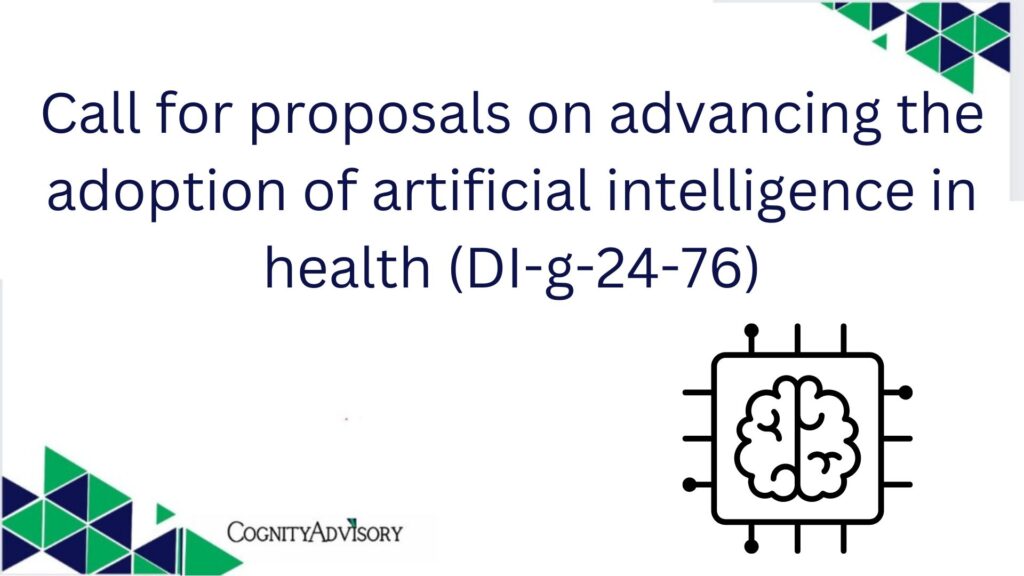General information
Programme
EU4Health Programme (EU4H)
Call
EU4H Action Grants 2024 (EU4H-2024-PJ-03)
Type of action
EU4H-PJG EU4H Project Grants
Type of MGA
EU4H Action Grant Budget-Based [EU4H-AG]
Open For Submission
Deadline model
single-stage
Opening date
17 September 2024
Deadline date
22 January 2025 17:00:00 Brussels timeTopic description
Expected Impact:
The action is expected to:
a) create communities of experts with knowledge and experience on AI deployment in clinical settings;
b) identify challenges and accelerators of the safe and effective deployment of AI in clinical practice;
c) develop good AI deployment practices (e.g., appropriate incorporation of AI in clinical practice, ethics, etc.), guidelines and recommendations to speed up the safe and effective deployment of AI in health;
d) test and evaluate through pilot projects how good deployment practices, guidelines and recommendations benefit diverse environments and diverse populations (e.g., metropolitan and rural hospitals). As part of the pilots, to analyse how clinical practice is changing with the incorporation of AI systems;
e) expand knowledge on AI uses in medicine and develop trust on AI by both healthcare professionals and public including patients;
f) prepare healthcare systems for full-sale application of AI;
g) educate relevant actors (e.g., healthcare professionals, hospital managers, AI developers, patients) on the best use and practices of AI deployment in healthcare;
h) educate individuals including patients on AI uses for diagnosis, treatment and management of patients;
i) provide a reference interactive digital tool to collect and communicate best AI deployment practices in healthcare and foster collaborations and communities; and
j) inform policy makers on the best way to accelerate the safe and effective deployment of AI in clinical practice.Objective:
The overarching objective of this project is to accelerate the safe deployment of AI systems in particular in clinical settings. One project is expected to be funded under this call.Scope:
The activities for this action should include the following actions:
a) the setting up and running of one or more communities of experts (e.g., healthcare professionals who have experience in using/implementing AI in clinical practice and hospital managers who have experience in implementing AI solutions in healthcare organisations) and relevant stakeholders (e.g., developers of AI or AI based products and services, and patients) for delving into the potentials and challenges concerning AI deployment in clinical practice. In this respect, this should provide proposals on how to ensure sustainability of this expert community beyond the end of the project;
b) the analysis and identification of the factors that lead to the successful and less successful deployment of AI in healthcare as well as challenges and obstacles, in collaboration with the expert community or communities mentioned under point a) and taking into account existing studies and projects. Two particular areas of interest that should be included are AI in cancer and AI in remote areas and medical deserts;
c) the preparation of good deployment practices for AI in healthcare, recommendations and guidelines tailored to the needs of the specific users/environments in healthcare to accelerate the safe and effective deployment of AI in clinical practice in collaboration with the expert community or communities mentioned under point a) and taking into account existing studies and projects. This could include, e.g., how to address the diverse performance of AI systems in diverse clinical environments beyond reasons attributed to training/validation data and how the system was technically developed; how to address issues related to AI interaction with clinical workflows; obstacles related to ethical issues of AI in healthcare, AI-physician collaboration and impact on the doctor-patient relationship, as well analysis of risk of bias and how to address it.
d) the design, development, and execution of pilots to test and evaluate in diverse real-life environments the expert community(ies)’s developed good deployment practices, guidelines and recommendations. As part of the pilots, to analyse how clinical practice is changing with the incorporation of AI systems. Based on the findings from the pilot projects to update, if needed, the proposed good AI deployment practices and other recommendations and guidelines;
e) the development of user friendly interactive digital tool(s) that allows for the collection and communication of AI solutions successfully deployed in different clinical settings. The tool(s) should provide information on how the AI solutions are deployed to identify appropriate and useful information that should be indicated within the digital tool(s) that would be developed. The aim of such digital tool(s) is to engage relevant stakeholders and to support the formation of communities (e.g., develop contacts and, to enhance collaborations between the experts or healthcare professionals who are using AI tools in clinical practice or who are interested to the uptake of AI in their medical domain, to bring together healthcare centres using AI as well as those interested to deploy AI, to connect developers of AI with users of AI and enable patients to obtain valuable information on AI uses in clinical practice). These tools should be continuously fed with new updated information by the members of the community and other AI users. In this respect, the beneficiary should provide a proposal on how this system could be best updated and how to ensure sustainability of this system beyond the end of the project;
f) the organisation of workshops and communication activities (e.g., knowledge translation and dissemination of evidence-based practice/outcomes) addressed to different stakeholders (e.g., AI developers and users, hospital managers, the general public, patients). As part of these activities, to identify successful examples of AI deployment in healthcare and to provide an overview of these concrete success stories/good practices. These successful examples of AI deployment in healthcare should be displayed or included in the interactive digital tool mentioned in point (e) above. The beneficiary shall also produce other material (e.g., briefs, online campaigns) to explain and promote the safe, successful and trustful use of artificial intelligence in health to the relevant stakeholders and public;
g) the provision of a summary of lessons learned and recommendations for potential policy measures that would contribute to accelerating the safe and effective deployment of AI in clinical practice.
